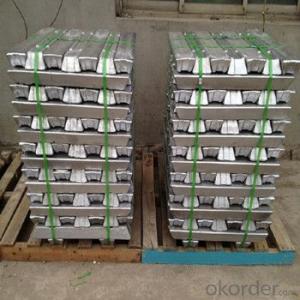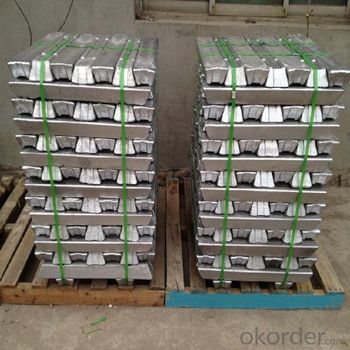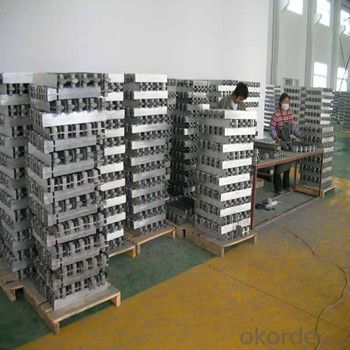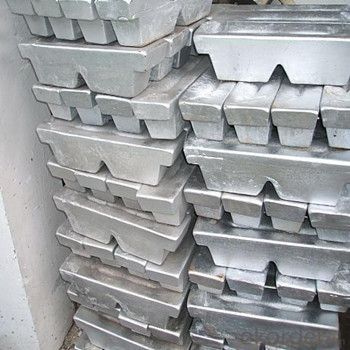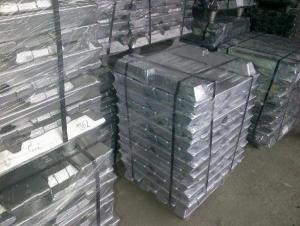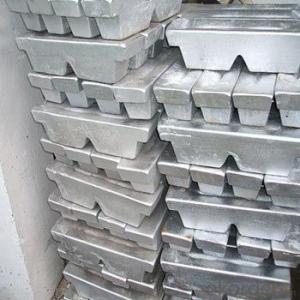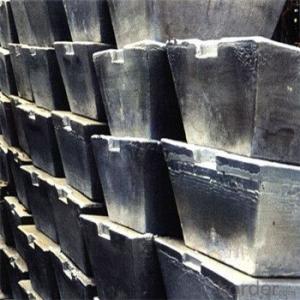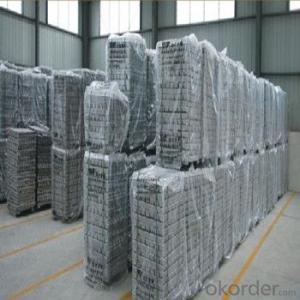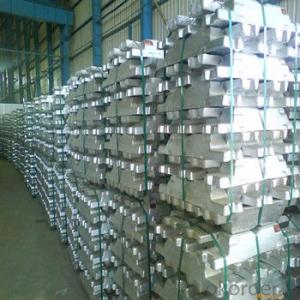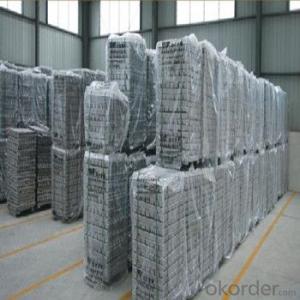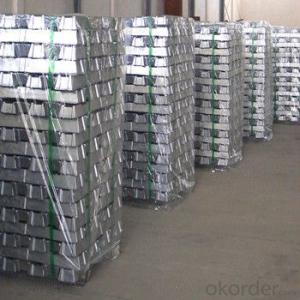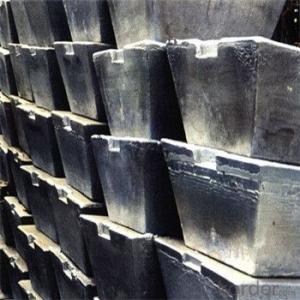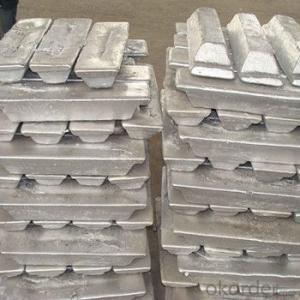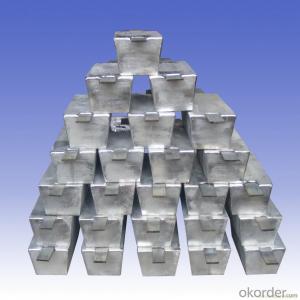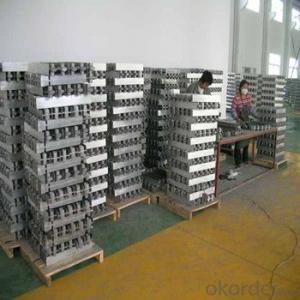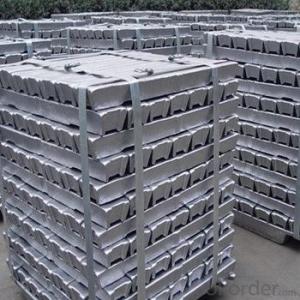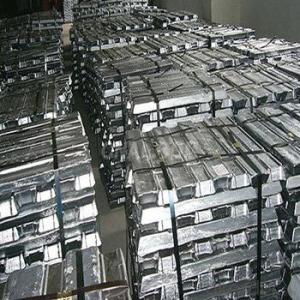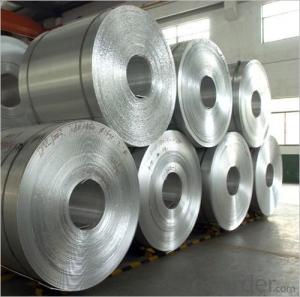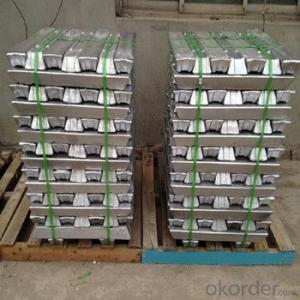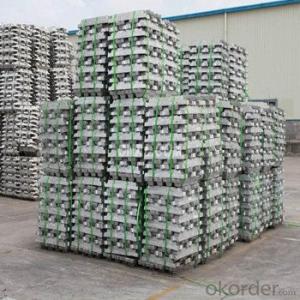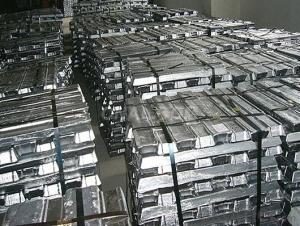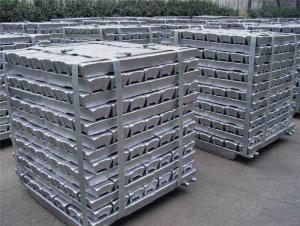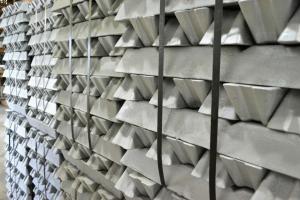Aluminium Ingot With Factory Price High Purity 99.7%
- Loading Port:
- China main port
- Payment Terms:
- TT OR LC
- Min Order Qty:
- 1000 m.t.
- Supply Capability:
- 10000 m.t./month
OKorder Service Pledge
OKorder Financial Service
You Might Also Like
Pure Aluminum Ingot Used for Industry
1.Structure of Aluminum Ingot Description
Aluminum ingot for remelting is produced by molten salt electrolysis method using alumina and cryolite. Products meet the national standard GB/T1196-2002. The surface of ingot is clean and smooth. An ingot is a piece of material, usually metal, that is cast into a shape suitable for further processing. Insteelmaking, it is the first step among semi-finished casting products. Ingots usually require a second procedure of shaping, such as cold/hot working, cutting, or milling to produce a useful final product.
2.Main Features of the Aluminum Ingot
•High Purity
•High strength
•Fast melting
•Best price
•Good after-service
3. Aluminum Ingot Images
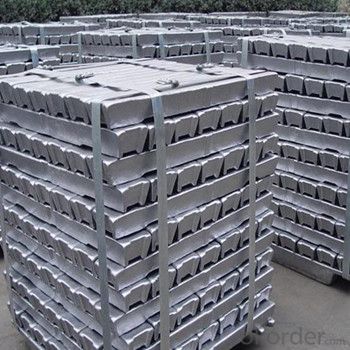
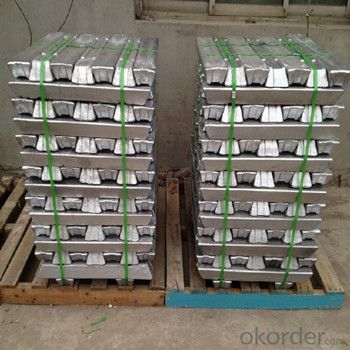
4. Aluminum Ingot Specification
Grade | Chemical Composition % | |||||||||
Al≥ | impurities ≤ | |||||||||
Si | Fe | Cu | Ga | Mg | Zn | Mn | others | Sum | ||
Al99.9 | 99.90 | 0.50 | 0.07 | 0.005 | 0.02 | 0.01 | 0.025 | - | 0.010 | 0.10 |
Al99.85 | 99.85 | 0.80 | 0.12 | 0.005 | 0.03 | 0.02 | 0.030 | - | 0.015 | 0.15 |
Al99.7 | 99.70 | 0.10 | 0.20 | 0.010 | 0.03 | 0.02 | 0.030 | - | 0.030 | 0.30 |
Al99.6 | 99.60 | 0.16 | 0.25 | 0.010 | 0.03 | 0.03 | 0.030 | - | 0.030 | 0.40 |
Al99.5 | 99.50 | 0.22 | 0.30 | 0.020 | 0.03 | 0.05 | 0.050 | - | 0.030 | 0.50 |
Al99.00 | 99.00 | 0.42 | 0.50 | 0.020 | 0.03 | 0.05 | 0.050 | - | 0.050 | 1.00 |
5.FAQ of Aluminum Ingot
We have organized several common questions for our clients,may help you sincerely:
①How about your company?
A world class manufacturer & supplier of castings forging in carbon steel and alloy steel,is one of the large-scale professional investment casting production bases in China,consisting of both casting foundry forging and machining factory. Annually more than 8000 tons Precision casting and forging parts are exported to markets in Europe,America and Japan. OEM casting and forging service available according to customer’s requirements.
②How to guarantee the quality of the products?
We have established the international advanced quality management system,every link from raw material to final product we have strict quality test;We resolutely put an end to unqualified products flowing into the market. At the same time, we will provide necessary follow-up service assurance.
③How long can we receive the product after purchase?
In the purchase of product within three working days, We will arrange the factory delivery as soon as possible. The pecific time of receiving is related to the state and position of customers.Commonly 7 to 10 working days can be served.
- Q: Can aluminum ingots be used in medical applications?
- Yes, aluminum ingots can be used in certain medical applications. Aluminum is lightweight, non-toxic, and has excellent corrosion resistance, making it suitable for medical devices such as orthopedic implants, prosthetics, and surgical instruments. However, it is important to note that aluminum should meet specific medical grade standards to ensure its safety and compatibility with biological systems.
- Q: How are aluminum ingots used in the production of transportation vehicles?
- Aluminum ingots are used in the production of transportation vehicles as they are melted down and shaped into various components such as engine blocks, wheels, body panels, and chassis. The lightweight and durable nature of aluminum make it a preferred choice in the automotive industry, as it helps improve fuel efficiency, enhance performance, and reduce overall vehicle weight.
- Q: Want to do a scrap processing of aluminum ingots of small workshops, about investment of about 100 thousand, the specific process, need what equipment technology, please expert advice
- Because it is profit, a ton of scrap, more of a water, is 160 dollars. The equipment is also very critical, when bad equipment in the melting scrap loss is large, so the water rate is down. Experienced and inexperienced, the difference in the rate of effluent can be 10 points. It is suggested that on-the-spot investigation should be conducted with prudent investment.
- Q: What kind of aluminum consumption does the furnace compare with natural gas?
- Oil burning more intense flame, smelting time will be much shorter than natural gas, this is the car after the gas, power is much better than gasoline. The answer is obvious: the aluminum loss of gas will be greater.
- Q: How are aluminum ingots used in the production of medical implants?
- Aluminum ingots are used in the production of medical implants in several ways. Firstly, aluminum ingots are melted down and cast into specific shapes and sizes to create the base structure of the medical implant. This process allows for the customization of the implant to fit the patient's specific needs. Once the aluminum ingots are cast into the desired shape, they are further processed to enhance their properties. This may involve heat treatment, forging, or machining to improve the mechanical strength, durability, and biocompatibility of the implant. Aluminum ingots can be easily manipulated to achieve the desired mechanical properties, making them suitable for various implant applications. Moreover, aluminum ingots are often coated with biocompatible materials to improve their performance as medical implants. These coatings can enhance the implant's corrosion resistance, reduce wear and tear, and promote osseointegration (the connection between the implant and the patient's bone). Additionally, aluminum ingots are lightweight, which is advantageous for medical implants as it reduces the overall burden on the patient's body. This is particularly beneficial for implants that are used in load-bearing applications, such as hip or knee replacements. Overall, aluminum ingots play a crucial role in the production of medical implants by providing a versatile, customizable, and lightweight material that can be processed and coated to meet the specific requirements of each patient.
- Q: What are the environmental benefits of using aluminum ingots in manufacturing?
- Using aluminum ingots in manufacturing processes brings about various environmental advantages. To begin with, aluminum is an extremely recyclable material that can be reused multiple times without losing its quality or properties. This means that the utilization of aluminum ingots reduces the necessity for extracting and processing raw materials, thereby conserving natural resources and decreasing energy consumption. Moreover, recycling aluminum emits significantly lower greenhouse gas emissions in comparison to the production of new aluminum from primary sources. Additionally, aluminum is both lightweight and durable, making it an ideal material for a wide range of applications. By incorporating aluminum ingots into manufacturing, one can contribute to the production of lighter and more fuel-efficient vehicles, thus reducing carbon emissions from transportation. Similarly, using lightweight aluminum components in construction can lead to energy savings during operation and a decreased overall carbon footprint of structures. Furthermore, aluminum exhibits excellent corrosion resistance, which extends the lifespan of products made with aluminum ingots. This prolonged durability reduces the frequency of replacements, resulting in less waste generation and a reduced demand for new materials. Through the utilization of aluminum ingots, manufacturers can actively contribute to a more circular economy by promoting the reuse and longevity of products. Moreover, aluminum ingots possess a lower melting point compared to many other metals, requiring less energy for processing and manufacturing. This reduced energy requirement translates into lower carbon dioxide emissions and overall energy consumption during the production process. Lastly, aluminum is non-toxic and non-magnetic, making it suitable for a wide array of applications, including food packaging and medical equipment. This ensures that products made with aluminum ingots do not pose health risks or disrupt sensitive equipment. In conclusion, the employment of aluminum ingots in manufacturing processes brings forth numerous environmental benefits. From its recyclability and lightweight properties to its corrosion resistance and low energy requirements, aluminum ingots contribute to the conservation of resources, decreased emissions, and a more sustainable and circular economy.
- Q: Does aluminum ingots produced without aluminum ore belong to metal smelting?
- The production of aluminium ingots without aluminum ore belongs to metal smelting.Without the use of aluminum ore, aluminum is also extracted from the compound and turned into free aluminum
- Q: What is the aluminum ingot smelting
- Aluminum is a commonly known as recovery. Aluminum is a chemical element. Its chemical symbol is Al, and its atomic number is 13. Aluminum is the third largest in the earth's crust, second only to oxygen and silicon, and is the most abundant metal element in the earth's crust. Among the metal varieties, second only to steel, they are the second major metals. Until the end of nineteenth Century, it has become the competitive aluminum made in the engineering application of the metal, and come into fashion. Aluminum is widely used in construction, automotive, aviation, the development of three major industries, the unique properties of material properties of aluminum and its alloys, which greatly facilitates the production and application of recycled aluminum metal.
- Q: What are the advantages of using aluminum ingots in electrical applications?
- There are several advantages of using aluminum ingots in electrical applications. Firstly, aluminum is a lightweight metal, which makes it easier to handle and transport. Secondly, aluminum has excellent conductivity properties, allowing it to efficiently carry electrical current. Additionally, aluminum ingots are highly resistant to corrosion, making them durable and long-lasting in electrical applications. Lastly, aluminum is a cost-effective material compared to other metals, which makes it a more economical choice for electrical components.
- Q: What are the challenges in sourcing sustainable aluminum ingots?
- Sourcing sustainable aluminum ingots is not without its challenges. One of the main challenges is ensuring that the aluminum is produced in an environmentally-friendly manner. This involves minimizing the energy consumption and carbon emissions associated with the production process. Many aluminum smelters still rely on fossil fuels for energy, which can have a significant impact on the environment. Another challenge is verifying the origin of the aluminum. It is important to ensure that the raw materials used in the production of the ingots are ethically sourced and not linked to deforestation, human rights abuses, or conflict zones. This requires a robust and transparent supply chain that can trace the aluminum back to its source. In addition, there is a need to address the issue of waste and recycling. Aluminum is a highly recyclable material, but there are still significant amounts of aluminum waste that end up in landfills. Encouraging and incentivizing the recycling of aluminum is crucial to reducing the environmental impact of its production. Furthermore, the availability of sustainable aluminum ingots can be limited. Not all aluminum producers have adopted sustainable practices, and there may be a lack of supply in certain regions or industries. This can make it challenging for businesses to source sustainable aluminum ingots consistently. Overall, while there are challenges in sourcing sustainable aluminum ingots, it is essential to address these issues in order to promote a more environmentally-friendly and responsible aluminum industry. By working towards sustainable sourcing practices, we can reduce the environmental impact of aluminum production and contribute to a more sustainable future.
Send your message to us
Aluminium Ingot With Factory Price High Purity 99.7%
- Loading Port:
- China main port
- Payment Terms:
- TT OR LC
- Min Order Qty:
- 1000 m.t.
- Supply Capability:
- 10000 m.t./month
OKorder Service Pledge
OKorder Financial Service
Similar products
Hot products
Hot Searches
Related keywords
